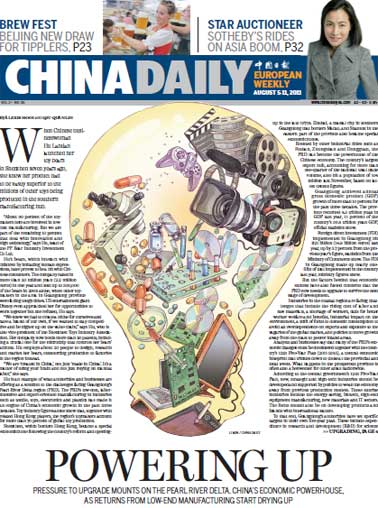People
Doing your bidding
Updated: 2011-08-05 11:15
By Mark Graham (China Daily European Weekly)
 |
"Wine becomes one of my great passions. I spend a lot of time in the wine cellar just sorting and looking and thinking and planning what to drink. I like the smell of the cases. I am a traditional Bordeaux girl but I go for Burgundy, and I also take great interest in discovering wines, Spanish, Italian and New World."
It is little wonder that Wong is always around to guide clients when Sotheby's holds its wine auctions in Hong Kong. She can advise clients in English, Cantonese and Putonghua on the merits of different wines or the finer points of Chinese ceramics.
Recently, a Sotheby's auction buyer paid $32 million (22 million euros) for an 18th century yellow-ground famille-rose double-gourd vase. The piece, from the period when Emperor Qianlong ruled, was from the collection of the legendary China-born dealer J.T. Tai, who made his name trading in New York and London. The price was a record for any piece of Chinese art.
According to Wong, more superb works such as this are likely to come to auction in the years ahead. More Chinese individuals and companies are buying Western-owned art, sometimes originally acquired in dubious circumstances, for return to China.
"There are still a number of important collections in Western hands. In fact, some of the world's greatest Chinese art remains outside China. Most of the collections are well-known to us, but there are so-called 'lost treasures' still throughout Europe and America."
One example is a famille-rose vase that was discovered in 2002. It had been used as a lamp in the house of an American ambassador. The porcelain fetched a world record when it came up for auction in Hong Kong.
Wong is known for the ability to move seamlessly between Chinese and Western cultures. The world traveler enjoys visiting new places and appreciates the energy in each city, which is supplied by the people she meets.
"I find the environment of London is beautiful, the old and new architecture. On the surface, English people are very gentle and look a bit relaxed, but in fact they are very thoughtful and don't rush into making quick decisions."
During two decades based at the Sotheby's head office in London, Wong has witnessed massive changes. In recent years the most dramatic shift has been the growth of Asian buyers and the introduction of new technology to a business that is known for its traditions.
"When I joined the company we didn't use paddles to signify that you were bidding, you just raised your hand and there was a gentle nod from the auctioneer, or it would be code names. It was very gentlemanly and old world," she says.
Sotheby's first introduced paddles as a way of signifying a bid during an auction of items owned by Andy Warhol, which drew so many people that the queue was around the block. Years later came Internet bidding, which was made popular during wine sales as they would going on for six to 10 hours.
"It has benefited our business and helped certain collectors participate in person virtually," she says.
Seriously wealthy collectors aren't the only ones who can join in on the adrenaline-filled banter. Those whose assets are somewhat below the billionaire level can still find something within their price range at Sotheby's. Wong advises people to buy what they find pleasing to the eye rather than snapping up a vase, painting or scroll to try and make money selling it later.
"With buying - and collecting - it is very important to buy what you like; it means you have your heart in it," Wong says.
E-paper

Double vision
Prosperous Hangzhou banks on creative energies to bridge traditional and modern sectors
Minding matters
A touch of glass
No longer going by the book
Specials

Ancient plate broken
An ancient porcelain plate was accidentally destroyed during a research in the Palace Museum.

Selfless actions
A 20-year-old girl becomes an Internet star for giving her first kiss to a drowning old man.

Space race
Homebuyers are learning the hard facts of supply and demand: too many cars and too few parking spaces.
